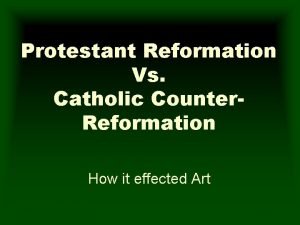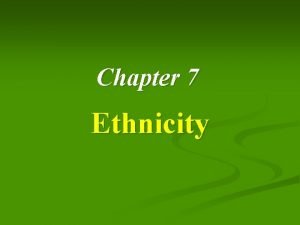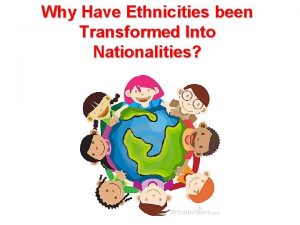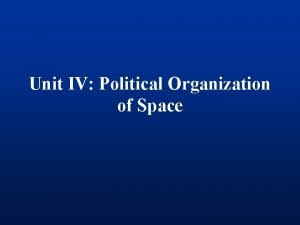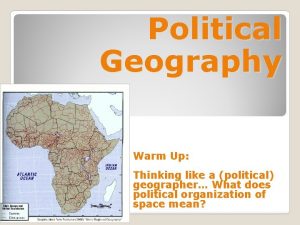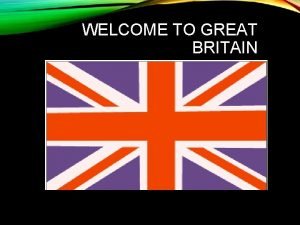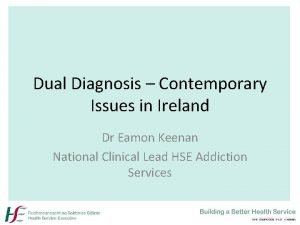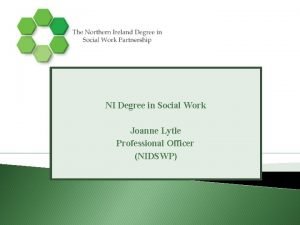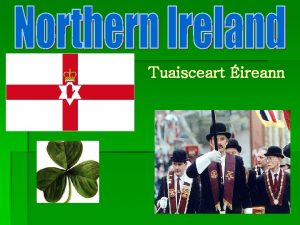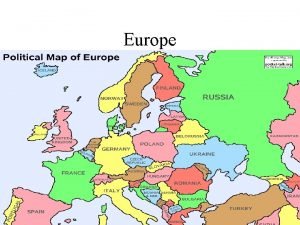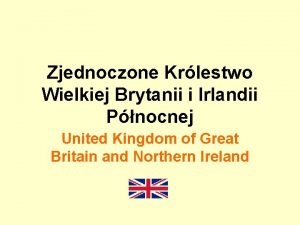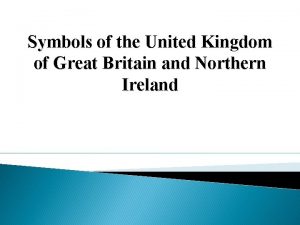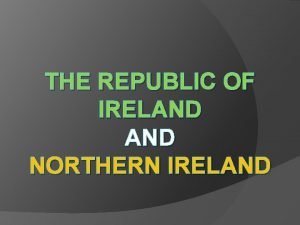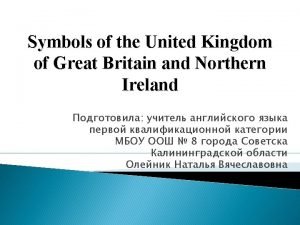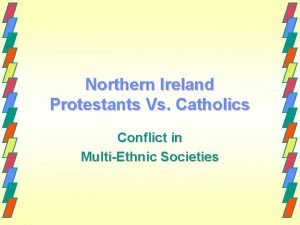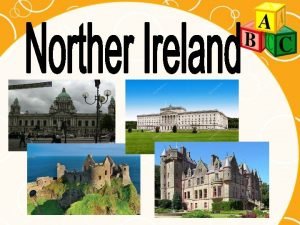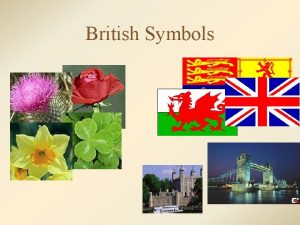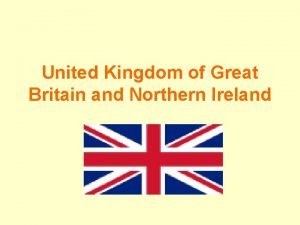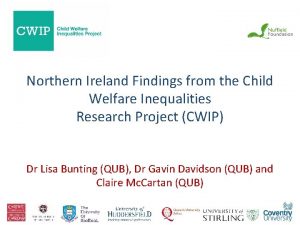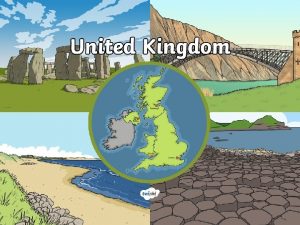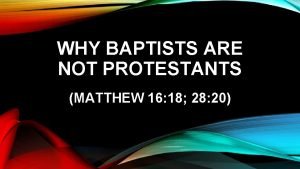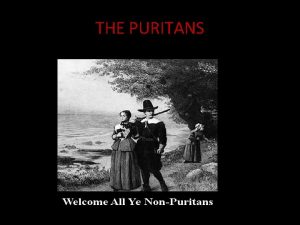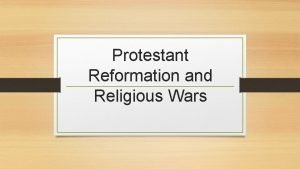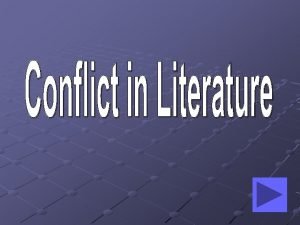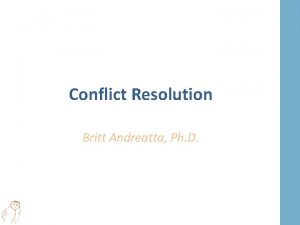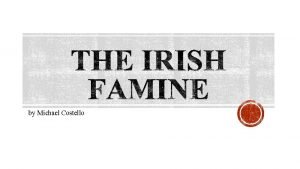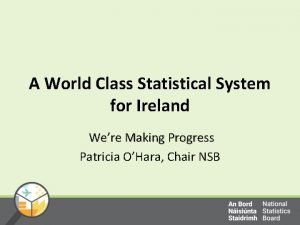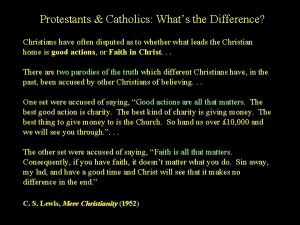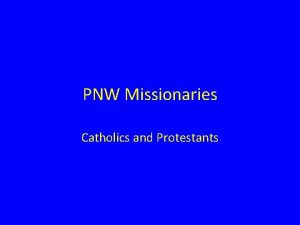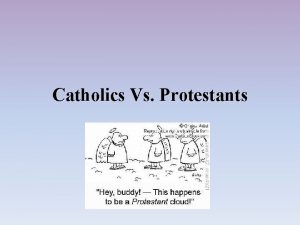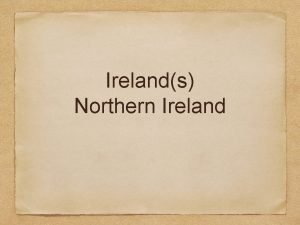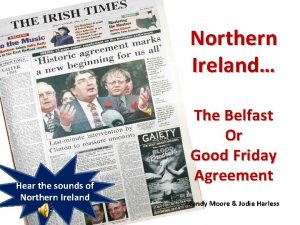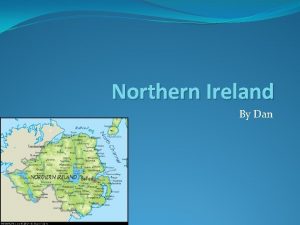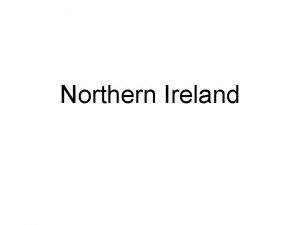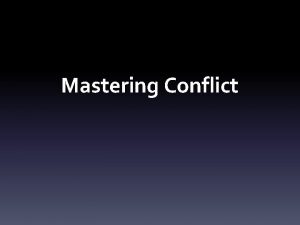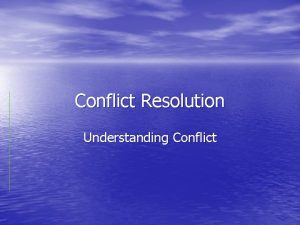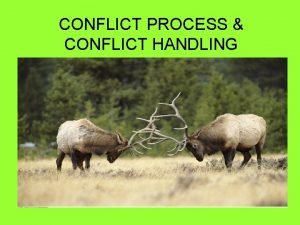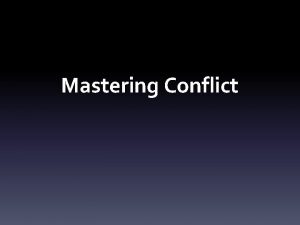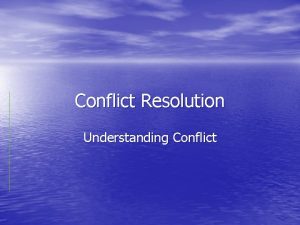Northern Ireland Protestants Vs Catholics Conflict in MultiEthnic








































- Slides: 40

Northern Ireland Protestants Vs. Catholics Conflict in Multi-Ethnic Societies





Background • During the 1100 s, Ireland was a united country • Subsequently it was conquered by England in the 1200 s • The Irish Catholics who stayed behind were given the less fertile land • English landlords brought in Protestant Scottish and English settlers into the northern parts of Ireland pushed out the local Catholic farmers

Background • Northern Ireland became predominantly Protestant • King James II (Catholic) came to the throne and tried to defeat the Protestants • He failed and was defeated by King William of Orange in the Battle of Boyne in 1690



Background • Penal Laws were implemented against the Catholics by the Protestants to ensure that they had complete control of Ireland – No Catholic can buy land – No Catholic shall be allowed to vote – No Catholic can join the army – No Catholic may receive higher education

Background • In 1800, Ireland became part of the United Kingdom (England) • In the late 1800 s, local Irish Catholics sought limited self-government known as Home Rule • Hostilities continued and were so bad that Britain lost control of the southern part of Ireland


Background • In 1921, Ireland was divided into 2 separate parts, based on majority religion – Northern Ireland (which was predominantly Protestant) – Southern Ireland (Irish Free State) • Had their own parliament but consulted the English monarchy regarding foreign affairs

Background • The Catholics in the North were treated very unfairly by the government • In 1949, the Irish Free State cut ties with Britain and became the Republic of Ireland


Background • Before 1972 – Northern Ireland had its own parliament in Stormont • Since 1972 – Northern Ireland has been ruled directly by the British parliament in London – Northern Ireland is in charge of commerce, health and education – Ministers are predominantly protestant

To Download Power Points • http: //misssnghumanities. pbwiki. com/Fr ont. Page

Causes of Conflict in Northern Ireland • Catholics and Protestants see themselves as 2 different groups • Lack of common identity prevents understanding and co-operation between the 2 groups. (This shows that Lack of Common Identity is the UNDERLYING CAUSE) • Religious differences cause tension BUT ARE NOT a cause of conflict

Causes of Conflict in Northern Ireland • • • Divided Loyalties Unequal Allocation of Housing Unequal Employment Opportunities Lack of Voting Rights Lack of Opportunities for Social Interaction

Causes of Conflict in Northern Ireland • Divided Loyalties – Most Protestants see themselves as British and do not want a union with the Republic of Ireland as they fear a Catholic government would not tolerate them and their beliefs

Causes of Conflict in Northern Ireland • Divided Loyalties – Catholics see themselves as Irish and want to be reunited with the Republic of Ireland – Catholics are also resentful of the history of English conquest where Catholics were killed or ill-treated

Causes of Conflict in Northern Ireland • Divided Loyalties – Loyalty to different countries makes the Catholics an

Causes of Conflict in Northern Ireland • Unequal Allocation of Housing – Provision of housing by city councils – Public houses are partly subsidized – Housing councils are predominantly Protestant – Large Catholic families have to wait for a long time to get houses – Catholics are frustrated by the long wait



Causes of Conflict in Northern Ireland • Unequal Employment Opportunities – Competition for jobs – Difficult for Catholics to get jobs in the civil service – Unequal employment opportunities for the Catholics despite having similar academic qualifications – The Catholics felt resentful and frustrated because they had no chance of having a bright future and supporting their families

Causes of Conflict in Northern Ireland • Lack of Voting Rights – Before 1969, voting rights were a problem because: • Only those who owned houses and businesses were entitled to vote in the elections • Each household was given 2 votes while business owners were given more votes based on the number of staff they had

Causes of Conflict in Northern Ireland • Lack of Voting Rights – Before 1969, voting rights were a problem because: • As the Protestants were richer and had bigger businesses, the Catholics lost out • Voting districts were also drawn up to include more Protestants

Causes of Conflict in Northern Ireland • Lack of Voting Rights – Since 1969, the system is fairer: • Everyone has a vote: – if he or she is a British citizen – Was born in Northern Ireland – Lived in the UK for 7 years • Voting districts were re-drawn to ensure fairness



Causes of Conflict in Northern Ireland • Lack of Opportunities for Social Interaction – Fully funded public schools for Protestants only and partially-funded private schools for Catholics only – Integrated schools set up by private individuals only attract about 5% of the total school-going population of Northern Ireland

Causes of Conflict in Northern Ireland • Lack of Opportunities for Social Interaction – Protestant children are taught British history and play British sports like rugby, hockey and cricket – They are loyal to the British and sing the British national anthem – Nothing about the Catholics or the history of Northern Ireland is taught from a neutral perspective

Causes of Conflict in Northern Ireland • Lack of Opportunities for Social Interaction – Catholic children are taught Irish history and play Irish sports like hurling and are taught the Irish language and culture – They are loyal to the Republic of Ireland see Britain as a foreign country – Nothing about the Protestants or the history of Northern Ireland is taught from a neutral perspective





Causes of Conflict in Northern Ireland • Lack of Opportunities for Social Interaction – Catholics and Protestants live in separate residential areas – Opportunities for social interaction are reduced

Homework • “The Irish conflict is mainly caused by a lack of social interaction”. How far do you agree with this statement? Explain your answer. [12 m] • Remember to give social interaction as the GF and 2 OFs • Weigh your lack of social interaction factor against the MAIN CAUSE of the conflict • Is it more important? Less important?
 Protestants vs catholic
Protestants vs catholic Site:slidetodoc.com
Site:slidetodoc.com Multinational state
Multinational state Stateless nation
Stateless nation Nation state
Nation state Multiethnic state definition
Multiethnic state definition Northern ireland capital
Northern ireland capital National symbol of northern ireland
National symbol of northern ireland Mary's meals northern ireland
Mary's meals northern ireland Dual diagnosis northern ireland
Dual diagnosis northern ireland Northern ireland social work degree partnership
Northern ireland social work degree partnership Northern ireland administrative divisions
Northern ireland administrative divisions Physical features of northern ireland
Physical features of northern ireland River shannon facts
River shannon facts Narodowy kwiat szkocji
Narodowy kwiat szkocji Northern ireland national flower
Northern ireland national flower Northern ireland ploughing association
Northern ireland ploughing association Northern ireland national flag
Northern ireland national flag National flower of northern ireland
National flower of northern ireland National animal of england
National animal of england Education welfare
Education welfare Longest river northern ireland
Longest river northern ireland Northern ireland population catholic protestant
Northern ireland population catholic protestant Northern ireland colleges
Northern ireland colleges Northern ireland national flower
Northern ireland national flower Dr raeburn
Dr raeburn Northern ireland official languages
Northern ireland official languages National flower of united kingdom
National flower of united kingdom Northern ireland national flower
Northern ireland national flower Northern ireland leprechauns
Northern ireland leprechauns Soscare northern ireland
Soscare northern ireland Northern ireland interpreting service
Northern ireland interpreting service Northern ireland national flower
Northern ireland national flower Baptists are not protestants
Baptists are not protestants Protestants vs puritans
Protestants vs puritans Protestant beliefs
Protestant beliefs Internal and external conflict definition
Internal and external conflict definition A struggle between a character and an outside force
A struggle between a character and an outside force What is conflict and conflict resolution?
What is conflict and conflict resolution? Michael costello ireland
Michael costello ireland Ogcio ireland
Ogcio ireland
